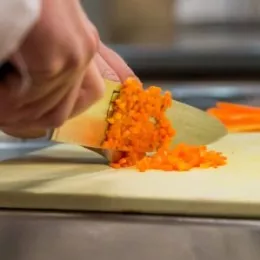Judy Joo, the studious, Jersey-raised daughter of Korean refugees, left Wall Street to bring the bracing food of Korea to TV and now a cookbook.
Uprooted by the communists, little Eui Don Joo, his eight siblings and their parents put what belongings they could on their backs and walked south. The family had been landlords and farm owners in northern Korea, but now, as war raged in the early 1950s, they were refugees. In his backpack, Eui Don, the youngest, about age five, bore the lightest load, but the most crucial: rolls of fine silk. With Korean currency worthless, silk could be bartered for essentials, most of all food.
Eui Don’s daughter, Judy Joo—author of the new cookbook, Korean Food Made Simple(HMH, $30), based on her Cooking Channel series of the same name—learned perseverence and scholarship from her father, who came to this country in 1967 after graduating from medical school in Seoul. She learned those virtues and Korean cooking from her mother, Young Nim Park, who left Korea in 1968 with a scholarship to Ohio State, where she earned a master’s degree in chemistry. Eui Don became a psychiatrist. Joo’s parents met in Michigan and eventually settled in Berkeley Heights.
At the exclusive Kent Place School in Summit, Joo and her older sister, Sonya, were the only Asians. “Our parents pushed us hard. ‘You have to succeed! Play the violin, play the piano, excel!’” Joo recalls with a laugh. “I didn’t read that Tiger Mother book. I lived it.”
Partly to help her daughters fit in, their mom made them pb&j sandwiches for school lunch. But family meals were always Korean and made from scratch. “The laundry room,” Joo writes in her cookbook, “teemed with jars and containers stacked precariously, filled with fermenting drinks, bowls full of soaking tripe, mung beans, bean sprouts, or rice. The adjoining garage had rows of drying seaweed on hangers, chiles, and a small foil-wrapped charcoal grill for barbecue perched in the corner.”
At Columbia University, Joo majored in industrial engineering and operations research. She became a financial analyst and, at age 22, worked the trading floor. “It was a crazy environment,” she recalls, “with 500 people on the floor, 48 phone lines, a headset, two handsets, six screens in front of you. You’re yelling all day. The market is always moving, so you have to handle stress effectively and have a ridiculous memory. You either sink or swim.” She swam, but soon realized she didn’t love the pool.
What Joo did love was food and restaurants. So she quit and got a degree in pastry arts from the French Culinary Institute in New York. Why pastry? “Because of the science factor,” she says, referring to the precision required. She cooked, among other places, at Thomas Keller’s French Laundry in the Napa Valley and Heston Blumenthal’s high-tech Fat Duck in London. After the stress of the trading floor, the pressure of a high-end restaurant kitchen was “not that big a deal.”
In London, Joo became a U.K. Iron Chef, competing in some 200 battles. She was executive chef of the London Playboy Club, working some Korean influences into her menu, when a backer who had eaten her food called out of the blue and offered her the chance to open her own restaurant. “I didn’t really want to,” she says, “because I knew how much work it was.” But she bit.
Jinjuu (Korean for Pearl) opened in London’s Soho in early 2015. By year’s end, through a cold call from another backer, she had opened another Jinjuu in Hong Kong. Now she commutes between those two cities and New York, where she appears on various Food Network shows and sees her family.
Joo’s book leads cooks gently from dishes that have gone mainstream—like crackly Korean fried chicken and kimchi, the spicy fermented condiment and ingredient—into the heart of a hearty and healthy cuisine.
Anything Jersey in the book? Yes! Kimchi pulled-pork disco fries—a tribute, Joo says, to the many hours she whiled away in the diners of Route 22.
By Eric Levin
Appears in the July 2016 issue of New Jersey Monthly
Judy Joo graduated from the International Culinary Center (ICC), founded as The French Culinary Institute (FCI). In 2020, ICE and ICC came together on one strong and dynamic national platform at ICE's campuses in New York City and Los Angeles. ICC’s culinary education legacy lives on at ICE, where you can explore your own future in food.


